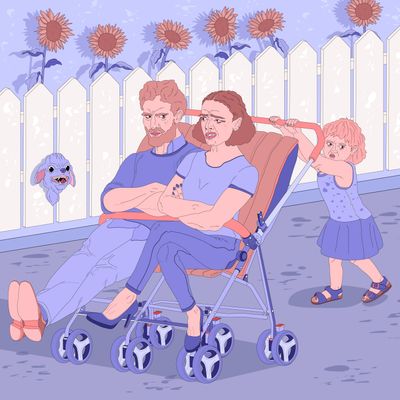
Do you tend to look after your friends and lovers? Maybe you’re the supportive one people always come to for advice. Perhaps, too, you are the kind of person who takes on a lot of responsibility at work. You are a perfectionist. A people pleaser. A workaholic, even. You may also be highly self-reliant and struggle to relax. Possibly you have never found it easy to set boundaries or say no to requests. If so, watch out! You may have been a “parentified child.”
Like gaslighting and narcissism before it, parentification is a pop-psychology term in the ascent. “Being a parentified child means we didn’t really get to experience our childhood as children,” reads the caption of a typical TikTok on the subject. Lingering symptoms, the therapist who posted the video explains over B-roll of herself cleaning her toilet and folding laundry, include feeling “guilt and anxiety if someone else does something for you.” In another, a therapist describes the parentified child as someone who finds even going to a restaurant stressful. They will scrutinize the waiter’s facial expression and worry if he is annoyed at them or “wearing an itchy shirt.” Last year, the Atlantic charted a trend of social-media users identifying with the closely related “eldest-daughter syndrome,” although it warned that “research on eldest daughters specifically is limited.” Elsewhere listicles detail, for example, the four warning signs that an adult may have experienced parentification. Across all this content there is a tone that positions the fate of a parentified child as a tragic one. We see a narrative of neurotic adults, destined to fuss obsessively over other people at the cost of their own well-being, who should address this trauma with great urgency.
The idea of parentification was first outlined in depth by a pair of psychiatrists, Ivan Boszormenyi-Nagy and Geraldine M. Spark, in their 1973 book about how family relationships repeat themselves over generations. Based on patterns they noticed in their clinical work, the pair defined parentification as a common, and even healthy, part of family life. By doing chores and offering occasional emotional support to their parents, children develop skills that will carry them through adulthood. But, they observed, there’s also a troubling end of the spectrum, where some children are overburdened with adult responsibilities and receive relatively little support in return. Imagine, say, the child born into a tumultuous marriage forced to act as her parents’ therapist and co-conspirator. Boszormenyi-Nagy and Spark proposed that, in this more extreme scenario, a parentified child might grow into an adult with attachment issues in their other relationships and that these attachment issues could possibly lead them back into the same pattern with their own children.
This book wasn’t mass-market self-help, but it wasn’t a research paper either. It wasn’t pitched as a rigid taxonomy of childhood trauma mapped onto adulthood but, rather, more modestly, as some notes that might be helpful to fellow therapists and families. These observations did indeed strike a chord. The book has been cited in academic papers almost 4,000 times, according to Google Scholar. Still, there’s not much empirical research into parentification, and that which does exist is riddled with problems. Studies often rely on giving questionnaires about parentification out to groups of college students, meaning they’re conducted on a narrow demographic and heavily rely on subjective self-reporting and fallible childhood memories.
A meta-analysis of existing research from 2011 looked at 12 empirical studies and found a positive link among childhood parentification and adult eating disorders, personality disorders, and anxiety but qualified this by saying that, again, the data it ultimately relied on was self reported and the number of available studies small. It concluded that its findings “must be interpreted cautiously.”
“The extent to which there is a well-defined, clearly operationalized, readily measured concept of parentification is really up for debate,” Dr. Dylan Gee, a clinical psychology professor at Yale with a focus on child development, told me. “Yet it’s often used in pop culture in this way, where it’s this really clear construct, and people can kind of project their own meaning or their own experience onto it.” This actually may be one reason for the term’s popularity. “I think some of these terms or concepts from psychology that really take off on social media do so in part because they resonate with a lot of people and in part because by nature of being ill-defined, they can morph and apply to many people’s experiences,” she said.
Still, if parentification is not well-evidenced, does that mean it is not “real”? The essence of what it describes clearly feels familiar to many people. In my own life I can think of quite a few people I know who fit a certain pattern: extremely competent adults who were far from coddled children and now have a tendency to give a little too much. People who rushed home from school to cook meals for younger siblings and do homework while parents were at work, looked after family members struggling with alcoholism or mental-health issues, or who found themselves playing therapist during divorces or affairs. It simply seems logical, too, that the more responsibility for looking after yourself and others you had from a young age, the more you will likely take on as you get older. And that this may spill over into taking on too much. I have spent more than a few sessions of psychoanalysis trying to step out of familiar patterns and get better at saying no.
Strangely I think this sense of underlying recognition is why I find the pathologizing tone of parentification content so irksome. Especially when the research doesn’t really support this interpretation. Why should we see it as a sign of “trauma” if you keep on top of cleaning your own toilet? We all have our issues and self-defeating tendencies we would like to work on. But if a person reaches adulthood and their biggest issue is that they’re a supportive friend, with a tendency to push themselves to always go above and beyond, I would say, in the grand scheme of things, that this person is doing pretty well.
I’m not the only person who recognizes some truth in the idea of the “parentified child” yet recoils at this excessively hand-wringing framing. One man in his early 30s, Peter, told me he spent much of his teenage years making breakfasts, lunches, and dinners for three younger siblings while his parents went through an acrimonious divorce. He served as the “channel of communication” between his parents too. When he learned to drive, he did the school runs. Today, he sees his parents as people in a difficult situation. They were immigrants without an extended family network to rely on. And his mom made the choice to stay in the country they had moved to so the children could have a relationship with their dad. “She sacrificed a lot. And she didn’t feel that sacrifice was acknowledged or appreciated, and that tortured her,” he said. Now he finds he is generally the caretaker in relationships. “I’ve had at least five different partners say that I was a safe place.” He doesn’t mind. “Because I have resilience. I’m okay with that.”
Another woman I spoke to, Helen, echoed this sanguine outlook. Her mom is an immigrant, too, and both her parents had jobs as nurses doing shift work. “From when I was about 11, I would be left at home all day to look after my siblings. But I loved it. We had fun. I bullied my youngest sister way too much,” she told me, laughing. “At the time, it didn’t feel extreme or different. It’s only when I look back on it, but I look back on it with a lot of fondness. I appreciate being given a lot of responsibility. I think that’s part of the reason I grew into the person I am, who’s very capable and independent.” She was her mother’s confidante. “Especially since she was an immigrant. I think she didn’t have girlfriends to confide in.” Helen, who is now a mother, has taken a lesson from this. She never wants her kids to feel that her “emotional state is dependent on them.”
Mostly these conversations about childhoods and families reminded me of how strange many families really are. There was the woman Sasha, who told me that, growing up, her parents were in a fraught, messy marriage and, for reasons she still doesn’t understand, scattered the family across two separate countries. Her father and sister in one, she and her mother in another. “It was a strange decision,” she said. There was Ciara, who, as an 8-year-old, would conduct logistical phone calls on behalf of her family. She now has perfect email manners. Or Ella, whose parents divorced when she was a child and then went on to remarry and divorce three times each before she was 18. “When people complain about divorce as this huge traumatic thing in their childhood, it can be traumatic. I’m not saying it can’t,” she says. “But, like, I’ve had six of them.”
In some instances, parentification seemed an almost condescending, or at least incomplete, way to describe a childhood centered around a parent’s addiction or severe mental illness. Like Mary, the only child of an alcoholic mother with bipolar disorder. Her father died when she was 14, and she was responsible for taking care of her mother. She articulated a much more complex state of being than worrying about being rude to waiters in restaurants: “I was forced to grow up really early so I felt 21 when I was 16. Now that I’m 21 I feel maybe 27, and life can feel so aimless, because I am not needed anymore by her.”
Another woman, Orla, said she was her mother’s “confidante and go-between” during her parents’ divorce. Orla’s mother demanded constant emotional validation from her. Sometimes, when Orla was out at parties as a teenager, her mother would send messages saying Orla didn’t care enough about her or love her. Occasionally she threatened suicide. “My mum wasn’t a grown-up and, as much as I love her, isn’t a grown-up,” Orla said.
There is context to this, Orla explained. Her mother’s mother had died when she was young and this, Orla speculated, had probably triggered a fear of abandonment. Orla and her mother now have a good if odd relationship. Her mother has never really admitted what their relationship had been like and Orla feels frustrated about this, but she also wants to resist “pathologizing” herself and the impact her childhood has on her decisions as an adult.
I could boil down Orla’s situation, or any of the other stories I heard, to a list of TikTok-friendly bullet points and relatable terms. But the essence of her particular story would be lost. This is what struck me when talking to “parentified children”: not that a common thread of negative symptoms ran through everyone’s adult lives, but rather that their stories seemed so hyper-specific I wondered if anyone outside of these relationships could truly relate to them.
But perhaps that’s why the term is so appealing. A label does not only describe an experience, it also identifies a group. Parentification is vague enough that all kinds of family circumstances can loosely fit under it. There’s comfort in feeling that a complicated, hard-to-make-sense-of childhood could be summed up with a label; that your atypical experience was one shared by other people too.
What does a normal childhood look like? I thought about that Tolstoy quote about happy families. I had accepted the truth of unhappy families being unique because stories of dysfunction often seemed unique. Now I wonder if odd, “dysfunctional” situations are always unhappy ones. Ella, who was responsible for helping to manage her dad’s finances during his various marriages and divorces, take care of her stepsiblings, and even craft texts to women he was seeing, said she now has a great relationship with him. “He’s a cool dude,” she told me. “He was honestly just trying his best, which is something I can relate to.”
I’m not sure I know any totally happy families. Or anyone who had an ideal childhood. Beyond labels like these, reality is better described, I think, as patches of happiness, unhappiness. Relationships that work despite strained circumstances, or those that work eventually. And those that don’t. In the end, an imperfect situation is the one that you, and practically everybody, had.
More From This Series
- When TikTok Therapy Is More Lucrative Than Seeing Patients
- 21 Ways To Break Up With Your Therapist
- When Couples Therapy Becomes a Weapon




